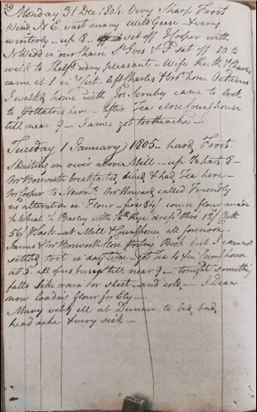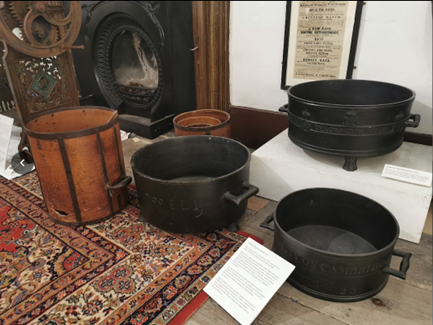Christmas had been a non-event for James Nutter who, as a Baptist and a true Puritan spirit, had worked most of that day. After all, Christmas had been condemned and banned in the 1640s by the Puritan parliament who saw it as too Catholic.
The first of January is also a working day for the miller of Cambridge and his son. Here is the diary entry for that day:
Hard frost. Skating on river above mill – up half past eight – Mr Bosworth breakfasted dined & had tea here – Mr Cooper to Newmarket – Mr Howard called friendly – No alteration on flour – fine 84/- coarse flour made 1/2 wheat 1/2 barley with 1/6 rye 12/cloth 56/ sack…[Entry 1 January 1805]

As a miller, James Nutter kept a close eye on market prices for wheat and flour. The prices, regularly recorded by him, showed that there was a sharp increase between October 1804 and January 1805. On 6th October, James noted that wheat sold at 5 to 11 shillings per bushel and flour at 60 shillings per sack. On 13th November, James wrote that there was a steep advance in the price of corn and that flour was now selling at 90 shillings per sack, a 50% price increase on October. This food price inflation was due to the poor yield of the 1804 harvest: “only 5 bushels per acre at Fulbourn” noted James on 29th December 1804.
James’ diary is an important local witness on the very deficient harvest of 1804 that brought on high prices and a lot of distress among the lower classes who could hardly afford bread. How do you feed the people of Cambridge when there was no wheat and when prices were so high? The solution found by James was to import grain from Hamburg by boat, via King’s Lynn and the canals of the Fens. He could do so because of relaxations in the Corn Laws that regulated the import and export of grain. Faced with the potential risk of famine, the government allowed the import of foreign grain, duty free (D. Barnes, p.90).
Food security was in the 1800s as big of a concern as it is now. The Times newspaper published on Saturday 28 December 2024 an article titled “Poor harvest adds to food insecurity fears”, relaying the current government warnings on food security after this year’s poor harvest – the third lowest harvest since 1984 when national records began. This means that there could potentially be a shortage of flour later in 2025, although the shortfall will most certainly be compensated by a rise in imports, just as it happened in 1805.
James Nutter clearly had contacts with grain merchants in Germany and, in December 1804, he receives a letter from Hamburg offering him a deal on grain. He felt rather “uneasy” (entry of 18th December 1804) buying from such a distant supplier but eventually put in a large order. Although war was still raging between France and England, the British did establish supremacy on the seas from 1803 to 1805, which meant that a cargo of grain would probably arrive safely at King’s Lynn – but of course, this was still risky. James was ready to take a chance, acquire a good deal and sell to the people of Cambridge the flour they needed for their daily bread.
Food security and food price inflation are both common themes in 1805 and 2025, and James’ diary reminds us that there are often parallels with the past.
References:
The unpublished diary of James Nutter, The Miller of Cambridge (Nutter family archives)
“Poor harvest adds to food insecurity fears”, The Times, Saturday 28 December 2024, p. 13
Donald Grove Barnes, A History of English Corn Laws from 1660-1846, Routledge, 1930
